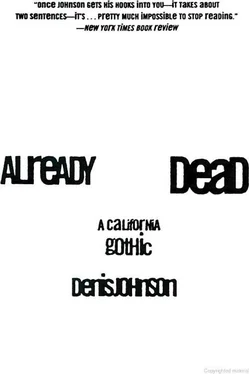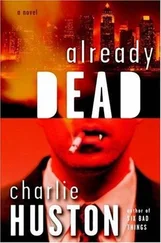And he felt like glass out here. And he didn’t like the wind. Usually there wasn’t any wind. Weird breeze, the moon brooding over it, you can’t do this stuff when you feel like you’re made of glass. For something like this in L.A. they’d have news teams taping it and the block roped off and the whole neighborhood jostling against the sawhorses. But here, just the wind and the empty feeling of the Ranchero inland and the big blackness out to sea.
Officer Navarro hated to retreat, but he’d made a mistake coming out here. He backed up against the house, went inside after two taps on the French doors and then clomped through the silent living room, where parallelograms of moonlight gleamed on the hardwood floors.
“Ladies,” he called, “I’m gonna bring my wheels around back. I’ll try not to scuff the lawn.”
“Okay,” he heard somebody say softly. They were hiding in a back room.
Out front he started up his car and headed it around the house into the yard, lit up the search beam and headlights, and left the vehicle quickly, half-diving but feeling idiotic because, after all, it was merely a small-town thing and nobody’d been fired on — in fact he only had the wife’s word there was a weapon out there. It’s the trunk thing, she says he keeps it in the trunk, I see big-time dealer ordnance, RPG’s and such. And the Vietnam aura, all that, a lot of these guys haven’t given up feeling like killers because nobody ever let them off the hook for it.
At least in this desolate place his outsides matched his insides. But what had brought him here eighteen months ago? What was he doing up here where the sea and the wind made all this noise? Life had turned lonely after the third divorce. He’d felt his future wearing 62 / Denis Johnson
out and had left LAPD, applied to CHP, dialing up his dream, making it a thing. Was turned down — why? Did the Highway Patrol expect he’d been contaminated by LAPD? Then he’d tried the local constabu-laries, last stop before rent-a-cop; sent résumés to several small towns on the coast, was offered a job by every one, and moved up to Point Arena from East L.A., where things had been tense and mean in a way he now remembered fondly. In East L.A. he’d spent his shifts making his way among foreigners and perpetrators and the more-or-less mentally maimed, the slum dwellers rattling loose, who, when he restored them to order, shrilly accused him of trampling over the rights of “ordinary citizens,” and then shut up. Most of them had never met an ordinary citizen, never even seen one this side of their greasy TV screens.
Navarro hadn’t known too many either, sleeping in the day and working that area at night. But here in Point Arena he engaged with actual ordinary people every day, and they were beginning to terrify him. They never squawked about their rights, they just kept quiet or even appeared quite friendly while he issued them tickets or ordered them to leash their dogs on the beach or rattled his truncheon at their drunken teenagers and kicked out their teenage beachside fires. But behind the acquiescence skulked a buddy system of ordinary folks and their ordinary resentments — a network, a spiderweb, practically, of ordinariness.
Everybody he dealt with was somebody’s cousin. The youngster he prodded with a nightstick tonight was bound to be the one bagging his groceries tomorrow, the mayor’s nephew, the judge’s godson. There was a different way of handling things in a small town, and Officer Navarro didn’t know what it was. He just knew he wasn’t popular here.
This person in the field here would probably turn out to be his chiropractor. Navarro hoped so, he’d need his services after all this humping around. Navarro crawled softly, as much to avoid grass stains on his knees as to keep quiet. Suddenly he understood there was truly somebody else in this darkness. He could feel the man moving, flanking him, inadvertently he hoped, before he heard any movement or saw the bit of T-shirt flash briefly going through the headlights. Navarro jerked upright, said, “Freeze!” and moved to his left quickly. The figure didn’t stop or fire but ran.
Navarro followed the footsteps into the dark, limping along as he buttoned the flap on his holster, then letting the adrenaline run his legs over the rough ground, caring for nothing, taking great breaths Already Dead / 63
of air, feeling brilliant, weightless, gaining on the white shirt.
As soon as he got his hands on the shoulders he knew it was a kid and tried to go easy, taking much of the fall on his own knees and elbows and, he knew, getting grass stains on them after all.
The kid’s breath went out of him in a whump. A young sound, kind of dreadful. A girl? He felt the kid’s chest. Thank God, no tits.
They’d run a fast two-twenty here, but the juice was still jolting through. He felt great. He had the kid wrapped in a headlock and felt him shaking, heard him wheezing, panting.
“What the hell are you doing? ”
No answer but sobs.
Navarro let him up. He kept hold of the kid’s arm. But he didn’t feel like putting a light in his face. He could see well enough.
“How old are you, kid?”
No answer. Navarro unbuttoned his light now and put the glare on him.
“You get a good look at them naked ladies?” The boy’s lips trembled wildly.
“Anybody with you?”
“They — no, nobody.”
“Your friends made a quicker exit, didn’t they?” The boy was thin. Navarro had his arm in a come-along hold, and it felt like it might break.
He let go. “Scat,” he said.
The boy stood there.
“Don’t come back,” Navarro said.
The boy took a few steps into the dark. “I’m sorry,” he said.
“Don’t apologize. Change your conduct,” Navarro told the boy, who was gone.
Back in the house, in the living room, where he stood talking to the two women with all the lights blazing, he told them the field had proved empty save for cattle. “It could be you’re getting spied on by kids.
Maybe you should put up one of those lattice partitions.” The two women stood hugging themselves, one in a Japanese robe and one in black terrycloth. “We were just absorbing a little of this rare energy,” the tall one said — Yvonne.
He gave her a military smile. “This an energetic neighborhood?”
“There’s a storm on the way.”
“Really?” Not a drop of rain had fallen in seven months.
64 / Denis Johnson
“Don’t you feel it?”
He did feel something.
He took a description of the husband’s car and promised to make a tour of the neighborhood. He took the husband’s last address and assured the two ladies he’d be looking in on the man. “But it doesn’t sound like a crime’s been committed,” he felt obliged to point out.
The homeowner, Barbara James, still legally Mrs. Shank, complained softly, with tears in her eyes. “Regular people are getting buried alive by laws. Meanwhile maniacs roam free.”
The women walked him out to his car. It looked eerie now, parked here in the backyard.
“G’night, Officer Navarro,” Barbara said.
“John,” he suggested.
“G’night, John.”
Yvonne said, “You might have to protect me from my latest ex one day. He’s dialing into some mysterious frequencies. Frankheimer.”
“Don’t know him.”
“By sight I think you would.”
“What does he look like?”
“He’d be the only one out there behind my house.”
“But I mean, help me out. How tall, please?”
“About seven feet.”
“I’m sorry?”
“Better get one of those zoo guns. One of those guns for tranquilizing elephants.”
He laughed. “I’ve seen him around.”
They said good night again and Navarro went out to the squad car, on the windshield of which he found a brief and kind of pointless note — he assumed it referred to Yvonne and had come from one of the peeping children. Did he look like a scholar? Why did everybody send him notes and letters? Driving away he thought to himself that Yvonne wasn’t such a bad sort. She was certainly a fine specimen. He didn’t know what it was about her. When he’d walked in she’d said,
Читать дальше












